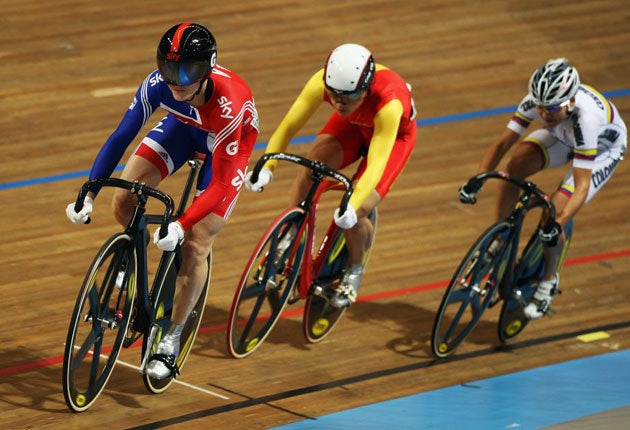Cycling: Britain's slender medal return raises questions for London 2012

After Victoria Pendleton failed to secure a place in the keirin final on the last day of the World Championships here in the Netherlands, such a low-key exit for Great Britain's medal prospects inevitably raised questions about whether the home nation are truly – and pardon the pun – on track for London 2012.
On paper, the contrast is simple: in the 2007 World Championships in Mallorca – their breakthrough year and with 15 months to go to the Beijing gold rush – the British scooped seven golds, two silvers and two bronzes.
This time around, though, the total is one gold, three silvers and five bronzes, while Australia, already on six gold medals after Saturday's racing, now – at first impression – appear to be the nation to beat in London.
There were other upsets for Great Britain, like Pendleton's bronze medal in the match sprint, the quintuple world champion's worst result since 2003. Apeldoorn was also the first time since Sir Chis Hoy missed out on a gold medal since 2007.
Within the British camp, the talk is of overall consistency and of winning eight medals in 10 Olympic events, albeit two coming in the same discipline, from Hoy and Jason Kenny in the individual sprint.
As for the comparisons between one World Championships and another at the same point in the Olympic cycle, they are written off as being plain unreasonable. Dave Brailsford, team principal, has often said that the chances of a repeat run in London of Beijing's seven golds is minimal.
So far, so predictable. However, Kevin Tabotta, who has an equivalent title to Brailsford in the Australian track program, is also convinced that the British are a long way from losing the plot. "No nation out there thinks that Britain is in decline, they're managing their talent for 2016 and beyond," Tabotta said. "You can't be winning golds in all the World Championships if you want to bring on the younger talent as well."
As for Australia's Anna Meares toppling Pendleton en route to taking the individual sprint title, Tabotta pointed out "it's taken Anna 10 years to do that. It isn't about the end of a reign, this is about being the best on the day and Vicky Pendleton has been the best on the day [as world sprint champion] for five years."
"It'd be foolish to rule her out, it'd be foolish to think the British are past it. 15 months is a long time in sport."
Tabotta insists Australians found themselves in a similar predicament after the 2004 Games, but that they have managed to bounce back.
German Heiko Salzwedel, twice a trainer with GB's track program over a five-year period and now heading the Russian track program, is more doubtful than Tabotta about the British results showing they are building for the future. "I cannot believe they are doing that so much for the future when they have to take a 40-year-old from the pursuit program and put him on the team sprint," he commented – a reference to Sydney gold medallist Jason Queally, now back in the sprint program after a brief period of retirement. "That said, they will have a lot of pressure in London, but they have experienced riders and when they put in more of their big weapons it will be a different story."
"The British are not going to be dominating every single year and every single Olympics, but what they've created is hopefully sustainable, and will have longevity." added Jamie Staff, now training the American sprint squad, but whose opening lap in Beijing in the team sprint, still the fastest in history, was the first step towards Team GB's run of seven golds.
"What's true, though, is that the other nations have stepped up, Australia has done that, the other major countries in Europe have done that too, and it's been good for the sport, taken it into another level. These days, track cycling is very much like Formula One."
Part of the issue is also that some of the greats of Beijing, like Hoy, have not been firing on all cylinders at Apeldoorn. But there is also the fact that some of the biggest players from 2008 have either been ill (such as Ed Clancy, last year's Omnium World Champion), retired (like Staff) or have road-race commitments, as is the case for Clancy's Olympic gold pursuit team-mates, Bradley Wiggins and Geraint Thomas.
Finally, perhaps in 2007 Great Britain's cyclists needed, psychologically, to prove to themselves they had the capacity to take on the favourites. This time around, that is not necessary: Beijing took care of that, for better and, perhaps, for worse.
Trailing the class of '07
* Great Britain won seven golds at the 2007 World Championships – including two each for Sir Chris Hoy and Victoria Pendleton – and 11 medals in total. This year has not seen the same success.
* GOLD - one
Women's team pursuit
* SILVER – three
Men's sprint J Kenny
Men's keirin C Hoy
Women's team sprint
* BRONZE – five
Men's sprint Hoy (right)
Men's team pursuit
Men's team sprint
Women's sprint V Pendleton
Women's scratch D King
Join our commenting forum
Join thought-provoking conversations, follow other Independent readers and see their replies
Comments
Bookmark popover
Removed from bookmarks